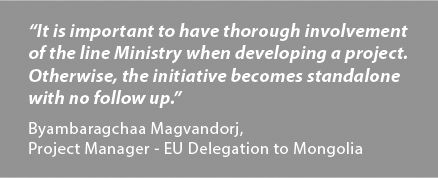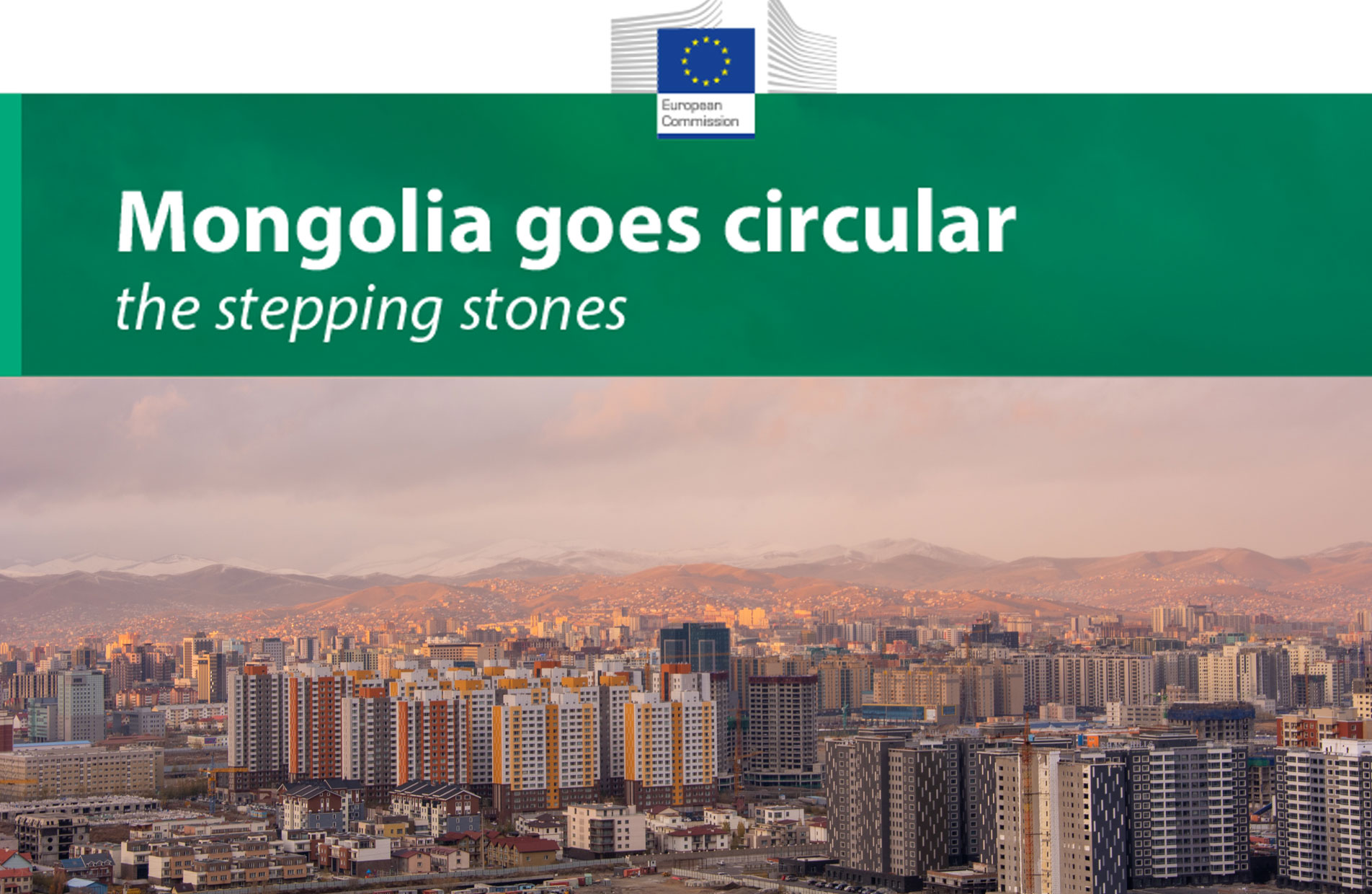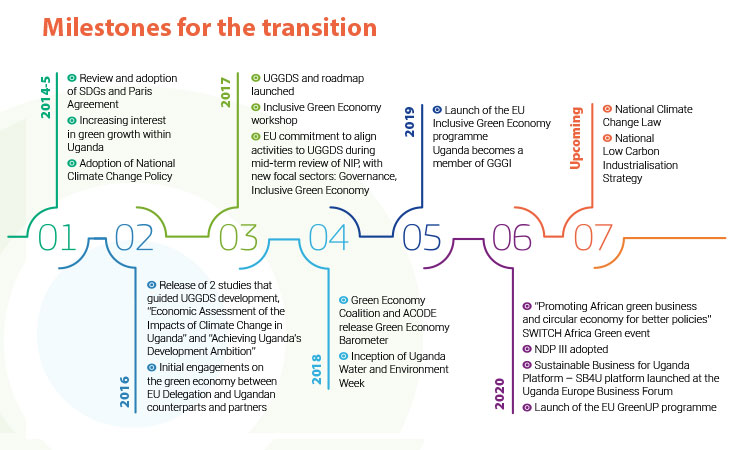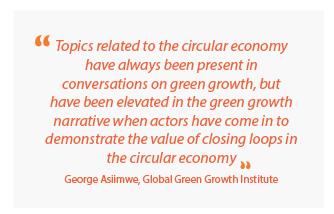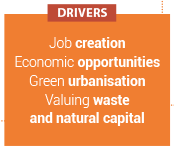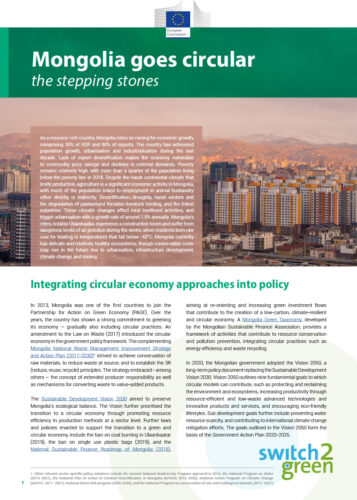Integrating circular economy approaches into policy
In 2013, Mongolia was one of the first countries to join the Partnership for Action on Green Economy (PAGE). Over the years, the country has shown a strong commitment to greening its economy – gradually also including circular practices. An amendment to the Law on Waste (2017) introduced the circular economy in the government policy framework. The complementing Mongolia National Waste Management Improvement Strategy and Action Plan (2017-2030) strived to achieve conservation of raw materials, to reduce waste at source, and to establish the 3R (reduce, reuse, recycle) principles. The strategy embraced – among others – the concept of extended producer responsibility as well as mechanisms for converting waste to value-added products. The Sustainable Development Vision 2030 aimed to preserve Mongolia’s ecological balance. The Vision further prioritised the transition to a circular economy through promoting resource efficiency in production methods at a sector level. Further laws and policies enacted to support the transition to a green and circular economy, include the ban on coal burning in Ulaanbaatar (2019), the ban on single use plastic bags (2019), and the National Sustainable Finance Roadmap of Mongolia
(2018), aiming at re-orienting and increasing green investment flows that contribute to the creation of a low-carbon, climate-resilient and circular economy. A Mongolia Green Taxonomy, developed by the Mongolian Sustainable Finance Association, provides a framework of activities that contribute to resource conservation and pollution prevention, integrating circular practices such as energy efficiency and waste recycling. In 2020, the Mongolian government adopted the Vision 2050, a long-term policy document replacing the Sustainable Development Vision 2030. Vision 2050 outlines nine fundamental goals to which circular models can contribute, such as protecting and reclaiming the environment and ecosystems, increasing productivity through resource-efficient and low-waste advanced technologies and innovative products and services, and encouraging eco-friendly lifestyles. Sub development goals further include preventing water resource scarcity, and contributing to international climate change mitigation efforts. The goals outlined in the Vision 2050 form the basis of the Government Action Plan 2020-2025.
How the EU helped kick-off a Circular Economy process in Mongolia
The European Union supports Mongolia’s transition to a green and circular economy through initiatives on energy efficiency, waste management, and the circular economy. The EU SWITCH-Asia Programme provides technical and policy support on circular economy topics related to sustainable consumption and production (SCP) covering themes such as green products, plastics, recycling and waste as well as construction. SWITCH-Asia has been a catalyst for Mongolia’s New Regulation on Construction and Demolition Waste (CDW) Management, paving the way for the use of secondary materials in the buildings and construction sector. The SWITCH-Asia SCP Facility has undertaken multi-stakeholder consultations and provided training on Sustainable/Green Public Procurement. Recently, the SWITCH-Asia SCP Facility developed an SCP Baseline Study to map relevant policies and stakeholders, and identify practices to support increased awareness on SCP.
With the Economic Governance for Equitable Growth (EG4EG), the EU funded a project aiming to strengthen the economic governance of revenues from Mongolia’s mineral wealth towards sustainable development. The EU co-funded Partnership for Action on the Green Economy (PAGE) also supports the country’s transition, with macro-economic planning and monitoring, mapping of the national policies on the green economy to SDGs, policy development, and training and capacity building.
Drivers for the circular shift
Acknowledging the need to increase the resilience of the economy and address volatility and risks related with Mongolia’s economic dependence
on mining and traditional livestock husbandry, both the National Green Development Policy and the Sustainable Development Vision support green and circular activities like renewable energy, ecotourism and sustainable agricultural value chains, as a means to diversify the economy and create jobs and growth.
Pollution has significant impacts on citizens’ health, especially in Ulaanbaatar.
By tackling pollution, the government aimed at protecting human health and
reducing economic losses. Increasing energy efficiency in housing and heating systems, and transitioning to alternative heating technologies are measures to reduce harmful air pollution levels. With solid waste management being a major issue in Mongolia, closing the loop of product life cycles is a key circular economy consideration towards managing resource flows and ensuring the availability of resources for future use.
Water scarcity threatens Mongolia’s development. Reducing water pollution and securing future access to clean and safe drinking water is therefore a priority of the Mongolian Government as reflected in the National Green Development Policy’s ambition for wastewater treatment and water reuse.
Circular economy practices are also confirmed by the Mongolian National Technical Committee on Standardization that endorsed Technical Requirements of Treated Wastewater Reuse in 2019.
Preventing the loss of essential natural ecosystems drives policy making as natural capital dependent agriculture and animal husbandry are significant economic activities in Mongolia. Protection of eco-systems secures traditional
livelihoods and employment in animal husbandry. Healthy ecosystems also allow for sustainable tourism in around 21% of the land that is protected.
The European Bank for Reconstruction and Development focuses on economic diversification, responsible mining, and the development of institutions, infrastructure and the private sector. Relevant blending projects with contributions by the EBRD and the EU include the Ulaanbaatar District Heating Project, the Green Cities programme, through which the EBRD supports the Capital City Governors’ office on a new Green City Action Plan, and the GrCF Ulaanbaatar Solid Waste Modernisation Project, which contributes to CE objectives by introducing proper waste management practices, and investing in a Construction and Demolition Waste Plant (CDW). The Mongolian Sustainable Energy Financing Facility (MonSEFF) is a credit line developed by the EBRD to enable the Partner Banks in Mongolia to finance businesses seeking to invest in energy efficiency. The EU-funded Green Economy Coalition (GEC) Dialogues supported the Economic Policy & Competitiveness Research Centre in Mongolia to build networks of civil society, business and government that drew up future economic scenarios and policy roadmaps to inform decision making, demonstrated the value of green investment, and helped local entrepreneurs access finance for innovative green, notably circular projects.
Ensure interest of and close coordination with the relevant focal point and line Ministries.
Finding an entry point for the green or circular economy narrative that is of interest to the Government is crucial; this is likely to come from other than the environmental sectors, for example, from infrastructure development. Coordination at the government level is equally important to the sustainability of a project, and to ensure implementation of the measures proposed.
Integrate circularity coherently across EU’s portfolio.
A coherent portfolio minimises overlap and increases efficiency of spending. By building on existing projects and stakeholder experience, a coherent integration of the circular economy in new actions can be achieved. In the context of a call for proposals, such as the one of the EU SWITCH-Asia programme, a relevant engagement strategy has been successfully promoted by encouraging potential applicants to discuss with on-going projects.
Ensure coordination among multiple stakeholders.
In Mongolia, multi-stakeholder working groups as for example promoted by the EU supported GEC dialogues project, bring together evelopment partners working including government bodies, civil society, and the private sector on topics like air pollution.
